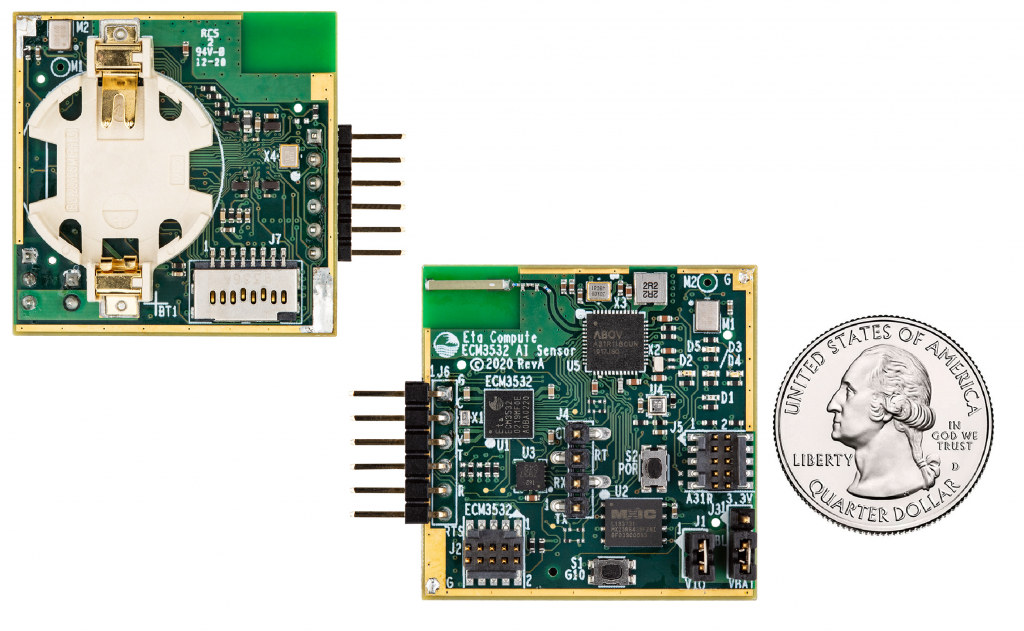Eta Compute ECM3532 is a system-on-chip (SoC) with a Cortex-M3 microcontroller clocked at up to 100 Mhz, and NXP CoolFlux 16-bit DSP designed for machine learning on embedded devices, aka TinyML, and part of the company’s TENSAI platform.
The chip is also integrated into the ECM3532 AI sensor board featuring two MEMS microphones, a pressure & temperature sensor, and a 6-axis motion sensor (accel/gyro) all powered by a CR2032 coin-cell battery.

ECM3532 AI sensor board specifications:
- SoC – ECM3532 neural sensor processor with Arm Cortex-M3 core @ up to 100 MHz (< 5μA/MHz run mode) combines with 512KB embedded FLASH, 256KB SRAM, and 8KB BootROM + secure bootloader, and NXP CoolFlux 16-bit DSP @ up to 100 MHz with 32KB program memory, 64KB data memory. See the product brief for details.
- Storage – 64Mbit serial Flash for datalogging
- Connectivity – Bluetooth 4.2 LE via ABOV Semiconductor A31R118 and PCB antenna
- Sensors
- 2x PDM MEMS microphones (TDK-Invensense ICS-41350)
- Pressure/Temperature sensor (BOSCH BMP388)
- 6-axis MEMS accelerometer & gyroscope (TDK-Invensense ICM-20602)
- Expansion – Micro SD card slot for other types of RF
- Debugging – 6 pin UART and power port
- Misc – 5x LEDs and push-button
- Power Supply – CR2032 battery or header
- Dimensions – 36 x 36 mm
The company provides a Neural Network API with support for CNN, RNN, LSTM, GRU, etc…, various sensors, as well as a Software Development Kit that includes support for popular machine learning training frameworks such as TensorFlow. The board is also compatible with Edge Impulse TinyML development pipeline.
The Cortex-M3 core is said to consume just under 1μA in sleep mode with RTC on, and 5μA/MHz in run mode thanks to Eta Compute’s proprietary CVFS (Continuous Voltage Frequency Scaling) technology with near-threshold voltage operation. The NXP DSP enables AI inference at a lower-consumption compared to competing solutions.
Applications target low-power embedded vision, wearables and hearables, asset tracking & monitoring, gesture, image, and voice-based user interfaces, IoT sensor nodes, as well as preventive maintenance and Industrial IoT.
More details can be found on the product page, and the ECM3532 AI sensor board can be purchased on Digikey for $99.

Jean-Luc started CNX Software in 2010 as a part-time endeavor, before quitting his job as a software engineering manager, and starting to write daily news, and reviews full time later in 2011.
Support CNX Software! Donate via cryptocurrencies, become a Patron on Patreon, or purchase goods on Amazon or Aliexpress





Seems lower power AI might be one day possible.
” A low-power AI alternative to neural networks
Researchers at the University of Newcastle have implemented a non-neural-network hardware that can significantly cut the power consumption of artificial intelligence ”
Wonder if this Tsetlin machine will fit the above topic use?
It’s research work, so it may take a few years before commercial applications become available, even if they have a test chip coming soon. Sometimes promising tech at the research stage never makes it. Just look at the battery technology breakthroughs in the news over the years. 99% fail to make it.
SoC = “System on Chip”
It would be great to see you do an independent review of this board doing something practical like turning some LEDs on and off via voice recognition (without the cloud) using the Edge Impulse TinyML toolchain.